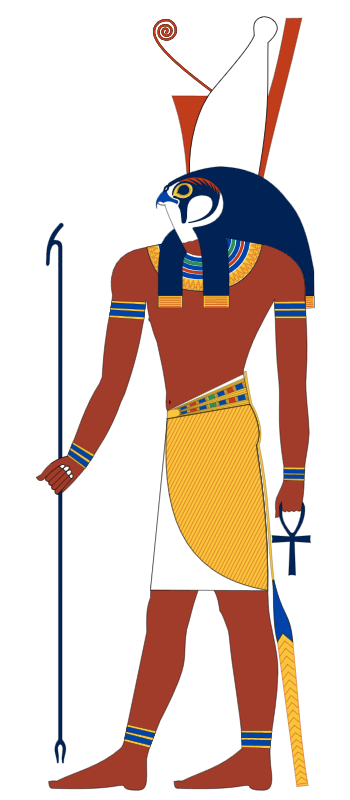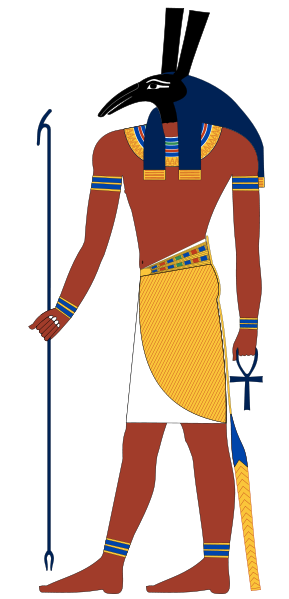The Self And The
Formation Of The
Unconscious
Decoding Of
The Religion Of
Ancient Egypt
Read Some Extracts
Here, in a few lines, is the essence and the message of the Osirian religion.
 Osiris is Isis’ husband and brother. His brother Set killed him and cut him into fourteen pieces, which Set scattered. Isis, by her magical force, finds the pieces and raises Osiris from death to conceive a son, Horus. After that, Osiris returns to be a god, dead but present just as if he were alive. He is an object of veneration by Horus and governs the dead’s judgment day. Horus will avenge his father and emasculate Set who will be able, however, to burst Horus’ eye, which will cure.
Osiris is Isis’ husband and brother. His brother Set killed him and cut him into fourteen pieces, which Set scattered. Isis, by her magical force, finds the pieces and raises Osiris from death to conceive a son, Horus. After that, Osiris returns to be a god, dead but present just as if he were alive. He is an object of veneration by Horus and governs the dead’s judgment day. Horus will avenge his father and emasculate Set who will be able, however, to burst Horus’ eye, which will cure.
Osiris is the good one, as says the Book; he is the initial human tendency to go toward coherence. This good side cohabits with a tendency that only wants to monopolize without worrying about others’ respect and about the surrounding coherence. There lies an action policy that reduces the inner awakening by limiting the opening toward outside. This egoistic side is Set, the impetus-toward-the-ego.
The good initial side, represented by Osiris, should have been active but it is put out of action by the development of Set, who, since the birth of the child, reduces little by little the possibility of his expression. Next, a new psychological component is built, which is the fruit of the relationship between this tendency of the self made inactive, which is Osiris, and Isis, who I present at this level of my work to be the positive activity of the inner awakening. This new tendency of the self is the coherent-impetus, Horus. He will be able to develop under the good influence of the positive mental activity and from the good basic seed which is Osiris; his goal will be to counterbalance the egoistic tendency which is the impetus-toward-the-ego, Set.
The soul, shackled and weighed down by Set, no longer exists in its past liberty of action; it becomes captive of the matter, captive of the densification in a material body. It is ipso facto limited in its capacities. There, we are at the forefront of man in his physical, mental, and spiritual dimensions; man who is the reciter of the Book and who has a self with two antagonistic impetuses: Horus and Set. Only Osiris is interested in the combat between Horus and Set, as he counts his situ ation, reincarnation after reincarnation. The goal of the reciter is to arrive at the final stage of sanctification and, after several reincarnations, to escape the densification trap and to definitively leave the carnal envelope.
ation, reincarnation after reincarnation. The goal of the reciter is to arrive at the final stage of sanctification and, after several reincarnations, to escape the densification trap and to definitively leave the carnal envelope.
However, going up this slope means allowing the development of the inner awakening in a positive way, which opens with respect to coherence; for this the influence of Set must be thwarted and the progression path will then be opened. Man must know and support the development of the psychological parameters that are available to help him: the gods and the goddesses. He must also identify the parameters able to delay his progression: the demons. To enter the meanders of such a project, one notices that it is at the same time psychological, religious, and philosophical. All of these disciplines have to converge; or rather to be recognized that they were basically one, one that man subdivided to see it more clearly!
One might think this a very daring thesis for a primitive civilization with a religion with heads of jackals and cows that seems closer to animism and magic than to an elaborate logic. One could also say that we did not discover among Ancient Egyptians philosophical movements that would allow us to suppose a mixing of ideas and a progressive development of thought; they have only this religion. Therefore, how could a logic so well sewn then be attributed to them? This argumentation is well placed, and yet if the Book Of The Dead holds the road with this type of logic and if it can go into the description of psychological dynamics, aren’t the coincidences then difficult to explain?
One could also say that it is only another religion that praises good and defends from evil under the sign of reward and punishment; as Freud would say: religion with an insipid taste and that does not go far. However, the Osirian religion does not rest on the narrowness of moralism and punishment; its importance rests on the interaction between the different gods and goddesses. It invites us to the development of a new impetus of the self, which is not the super-ego, and it directs the psychological progression far from sublimation and repression. It has a vision of sexuality much broader than the psychoanalytical vision. Here is one of its resources: it includes psychoanalysis while being a religion.
Thus, the chapters deal with the dynamics between the deities. In order that these dynamics keep their value and their brightness, and that they avoid being standardized by those who do not recognize their importance, the identities of the deities are kept secret. The fact of knowing to what each god corresponds constitutes only the threshold of entry into the superb world of this Book, which will interest especially the one who seeks to discover himself in the mirror of Truth.
What the Ancient Egyptian Book Of The Dead proposes is the discovery of how the various psychological components interact. A very pretentious project, we would say. Even our twenty-first century is only stammering in the discovery of psyche. I will let the reader discover what our ancestors of more than four thousand years ago already knew.
Contact the author:
rolandkhater[at]gmail.com
rolandkhater[at]yahoo.fr
*If you can't download one of the books, the author will send it to you for free by email.
Neither your email nor your message will be published..
